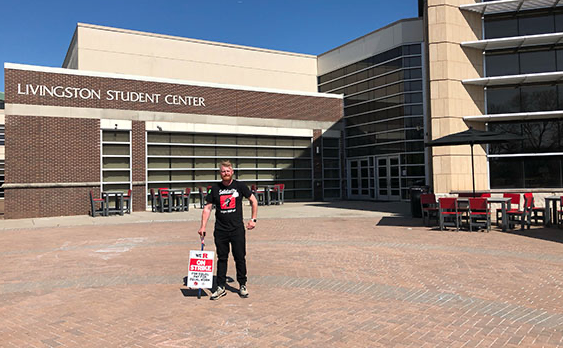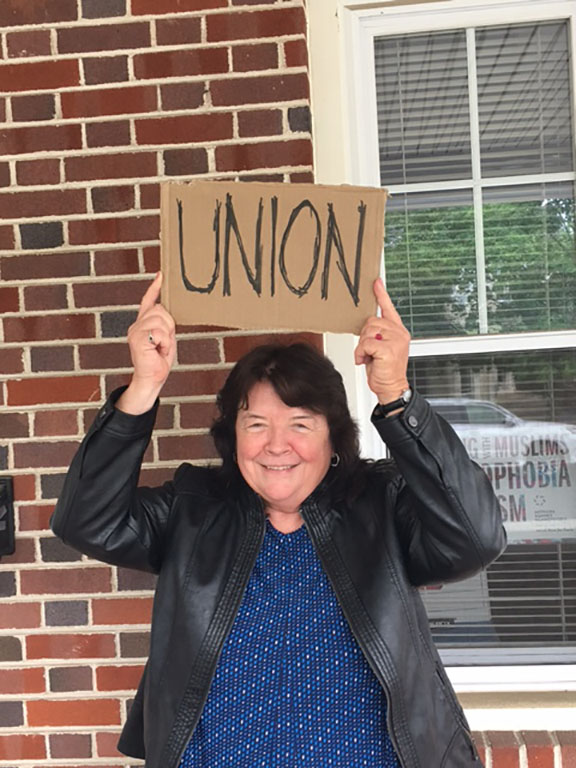
By Sunayana Prabhu
Thousands of faculty members and other employees at Rutgers University have been on strike since April 10, the first in the university’s nearly 260-year run. Many from the Two River area joined the picket lines as classes and research came to a halt at the state’s largest public university.
Four unions representing educators, researchers, clinicians and administrative staff at Rutgers University returned to the picket lines on all three campuses Wednesday, affecting the education of 67,000 students. Many at the three Rutgers campuses in New Brunswick, Newark and Camden have been off the job since Monday morning after nearly 9,000 members of the unions voted Sunday night to strike.
Among those striking is Keansburg resident Paul O’Keefe, an assistant teaching professor and undergraduate advisor in the school’s Department of Geography, as intensive negotiations continue in Trenton.

In a conversation with The Two River Times, O’Keefe said he’s been working without a contract for the past 10 months. He has canceled his classes and is concerned about the future. “(The strike) personally affects me because there is potentially the risk of pay being docked,” he said, but ultimately, the contract the union signs has to be at least “broadly acceptable to us.”
The union has “been preparing for years a range of proposals that we think would improve the working conditions of our members,” O’Keefe said.
Demands include “equal pay for equal work” for part-time and adjunct faculty and health care access, he said. The union is also demanding graduate assistants, “who are currently paid way below the cost of living in New Jersey,” O’Keefe said, be recognized by the university as workers so they can be part of the union, increasing job security.
According to a report by NJ Spotlight, the union is asking for a 20% salary increase over four years for full-time faculty, with cost-of-living adjustments to keep step with inflation. The union wants a nearly 38% salary increase for graduate workers over four years, with a 23.2% increase in the first year.
The union has been “bargaining” for years but “it’s been unsuccessful until we escalated our actions,” O’Keefe pointed out. He was optimistic as the third day of the strike progressed with stronger picket lines across the campuses. “Hopefully in the next 48 hours, we will certainly be coming to some kind of possible key moment.”
Intensive sessions of negotiations have been going on at Gov. Phil Murphy’s invitation between the striking unions and Rutgers negotiators at the governor’s office in Trenton since Monday.
According to the Rutgers University website, “The university is currently engaged in intensive negotiations with several unions… which together represent full-time professors and part-time lecturers, graduate student workers, post-doctoral associates, and EOF counselors.”
It goes on to state: “We are working hard to reach fair and reasonable agreements with our unions, but no matter the outcome of the labor negotiations, the well-being of all Rutgers students will remain our top priority.”
Several members of the union who have been advocating for their rights for years maintain that “Rutgers has the funding, but has chosen to place it in other areas, such as high-level executive position salaries and the athletics department,” said Ellen Williams, a Highlands resident and associate professor and 4-H agent at Rutgers. She said faculty salaries do not reflect the cost of living in a state like New Jersey.
Williams is a member of the faculty of Rutgers Cooperative Extension who provides instruction and facilitates community development throughout the state of New Jersey. “I have seen how the inadequate funding for Rutgers Cooperative Extension faculty has impacted our ability to fully realize our outreach mission,” Williams said. Her research has shown that at Rutgers University there is “serious pay inequity related to gender and race” and that the Rutgers faculty in “Camden and Newark receive less salary than New Brunswick faculty for the same work.”
Williams noted that part-time lecturers should be paid a “livable wage and receive a percentage of their health care costs correlated to the number of courses taught.” She further added that student tuition and fees “should not be raised to fill the gaps that Rutgers will not fill.”
Rutgers owns a considerable amount of New Brunswick property which they need to maintain physically and financially, but “not on the backs of its tenants,” she said.
“Our graduate assistants, teaching assistants and post docs provide critical support to the teaching, service and research work of Rutgers, but are severely underpaid.”
The three original striking unions are Rutgers AAUP-AFT which represents full-time faculty, graduate workers, postdoctoral associates and counselors; the Rutgers Adjunct Faculty Union, which represents part-time lecturers; and AAUP-BHSNJ, which represents health science faculty in Rutgers Biomedical and Health Sciences facilities. An additional union, Rutgers Administrators-AFT, joined the strike Tuesday, April 11. It represents 2,500 administrative staff throughout the Rutgers system. Together, the four unions represent around 11,500 people. AAUP-BHSNJ members have continued to perform patient care duties and critical research while curbing voluntary duties.
The article originally appeared in the April 13 – 19, 2023 print edition of The Two River Times.














